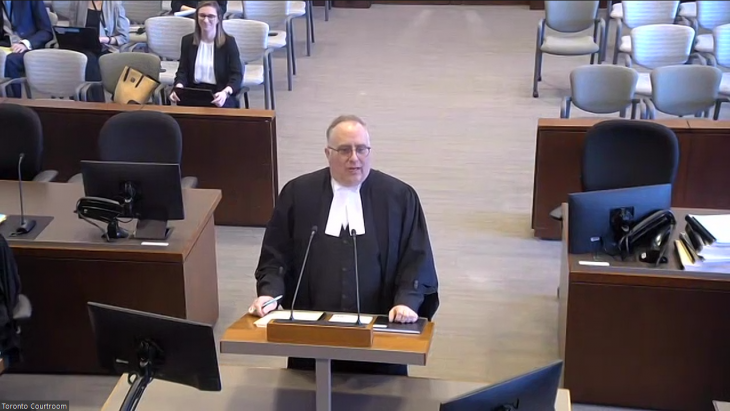
By Ahmad Hathout
TORONTO – The Federal Court of Appeal wrangled Tuesday with whether an IP address used to illegally download movies is enough to demonstrate proof of identity and therefore culpability for copyright infringement.
U.S. movie studio Voltage filed a motion for default judgment against 30 defendants – 29 individuals and one motel – who have allegedly been caught illegally downloading the studio’s film, Revolt. It is appealing from a lower court that denied its case on the basis that it did not conclusively show proof of the identity of the alleged infringer and should have filed a motion for discovery to determine that. The defendants were identified through a disclosure (Norwich) order in December 2018.
Voltage counsel Ken Clark argued Tuesday that the court should find individuals tied to those IP addresses liable by default for the alleged copyright infringement without the additional discovery process. The default part is because the defendants have allegedly failed to respond to multiple notices sent them, according to Clark. Clark argued that the discovery part is unnecessary because it doesn’t change the evidence in the case if the defendant fails to participate in it.
Central to the case is the uploading – also known as the “making available” part – of the movie. While software known as BitTorrent is widely known to serve as a source to download files, because it’s a peer-to-peer network, the downloader of the movie serves as a host and provider to others of the pieces that they downloaded.
Clark argued in front of the court that a reasonable “negative inference” can be made – when taken with the fact that the defendants have not responded to notices – that the individuals tied to the IP addresses should be held liable for the infringement. In other words, wilful blindness to notices should shift the balance in favour of the copyright holder when it comes to proving liability, he conveyed.
Clark, however, did acknowledge that there are “some” cases where someone else can use the IP address of the account holder, such as when someone accesses an unprotected Wi-Fi setup.
Because the defendants did not mount a defence, the University of Ottawa’s Canadian Internet Policy and Public Interest Clinic filled the void to argue against Voltage. CIPPIC has been on this type of file for years, having previously raised the point that IP addresses do not necessarily indicate the user of software on it.
The essence of CIPPIC’s argument is that Voltage failed to take the additional step to obtain direct evidence of the defendants’ activities and that failing to do so puts at risk the possibility that an innocent person is collateral damage in the process.
CIPPIC’s lawyer, David Fewer, argued Tuesday that the extra step of discovery to prove that a person authorized the downloading of the movie is required to satisfy the intent of the Copyright Modernization Act, which involves the authorizer sanctioning, approving, and countenancing the activity. Fewer rejected the notion that an account holder can be liable for not actively policing activity on their networks, which CIPPIC said is derived from Voltage’s wilful blindness standard.
“Voltage’s motion raises the prospect of establishing a low-cost litigation path, from Statement of Claim through Norwich Order through Default Judgement – and an award of statutory damages and costs – that will be followed by others,” CIPPIC said in its submitted arguments.
For years, Canada’s copyright system has attempted to balance both the right of the user and that of the copyright holder – a tightrope Justice David Stratas acknowledged was especially difficult in this case.
If the court were to accept CIPPIC’s argument, Stratas wondered whether the precedent from such a decision would create a “zone of immunity” for defendants. He described the circumstances in that particular case as a “cul-de-sac” – a dead end.
Voltage has been an active participant in the Canadian judicial system over at least the past decade, having filed a number of Norwich orders and obtaining settlements worth over $200,000 from Canadians. In this case, it sought to bring judgment against the last 30 out of 110 defendants, who have either settled or whose cases were discontinued.
The maximum the studio can get from an individual for non-commercial infringement is $5,000.
Screenshot of Voltage counsel Ken Clark on Tuesday.



